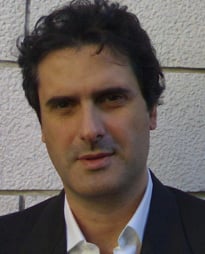EXPLORING INNOVATION
Editor-in-Chief of EMJ Respiratory Antonio Rossi reflects on the shift in professional healthcare education and the future of disease research
1. Please tell us about your field of expertise and three key highlights in your career in the last 10 years.
My field of expertise is clinical research in Thoracic Cancers. In the last 10 years, I have focused on gaining more experience in the field as I have been working as an Associate Professor in haematology, oncology and rheumatology.
I had an opportunity to work as Head of the Thoraco-Pulmonary Medical Oncology Unit, in San Giovanni Rotondo (FG), Italy. Since 2020, I have been the Senior Medical Director at the Oncology Centre of Excellence.
2. What aspects of EMJ do you think most benefit healthcare professionals in your discipline?
Updates from most recent main International Conferences, state-of-the-art treatment for any specific clinically/molecularly selected subgroup of patients, open discussion with the authors of recent clinical practice-changing trials, interviews with the president and/or members of the International Committees to discuss the future vision of the discipline.
3. Is there anything specific you have read or heard at EMJ that stands out as particularly useful?
I recently read updates from European international meetings which focused on the hot topics and included an interview with an opinion leader in the field of respiratory disease.
4. How do you see the future of healthcare education and what role do medical journals like EMJ play?
Due to the recent events around the world, the future of healthcare education will be mainly virtual. In this context, EMJ plays an important role in reporting the main findings with “real-time” “ad hoc” journal issues whilst organising virtual sessions with the authors of the clinical practice-changing trials.
5. In light of the COVID-19 pandemic have you noticed any changes in the way healthcare education is provided?
The way healthcare education is delivered has changed mainly to virtual meetings and “real-time” updates in specialised journals – which bodes well for its future.
6. Fake news challenges publishers across different types of content. Do you have any experience of it? How can journals like EMJ continue to cut through?
Having a scientific international board and adequate and recognisable sources of information might mitigate the potential risk of fake news.
7. It’s 10 years since EMJ launched – what do you think has been the most significant development in your field of expertise? What do you see as the main focus for the next 10 years?
Advancements of the last 10 years have surpassed those reported in previous decades. This is due to the continuous development of new technologies and the detailed knowledge of cellular mechanisms that have occurred in recent years. Today’s premises give hope for future research in both high-incidence diseases and rare ones – which are now the main targets for researchers.






